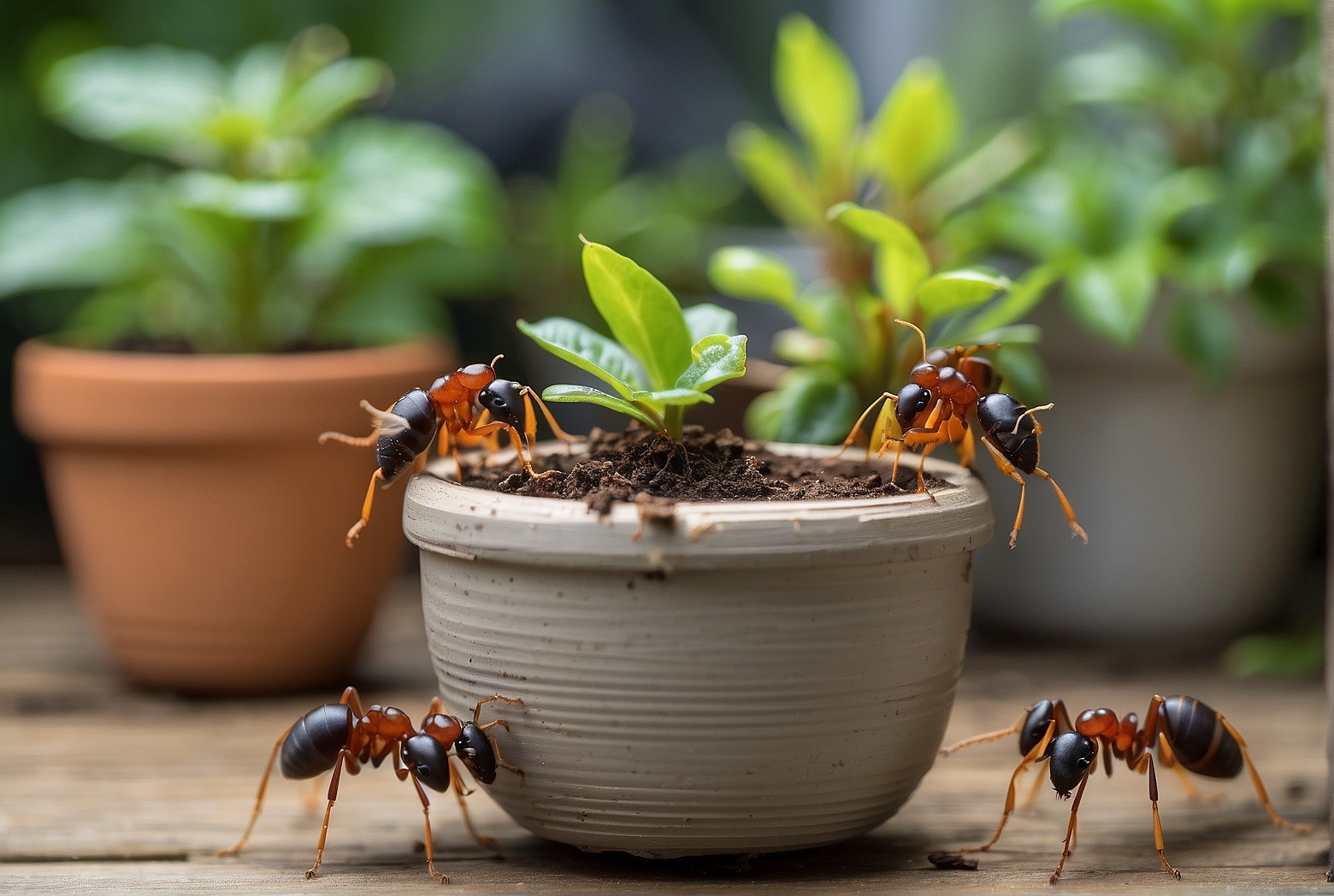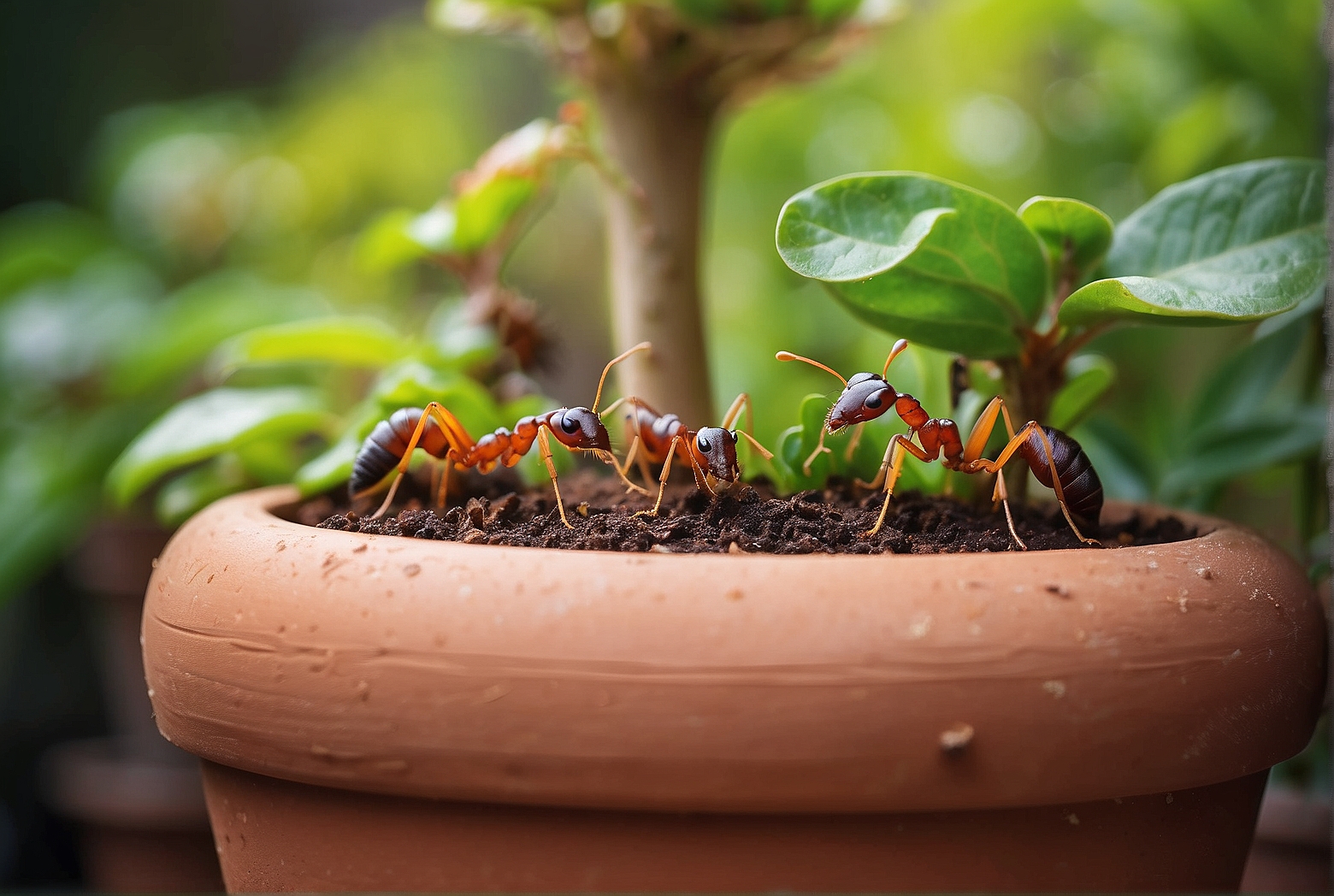Ants in potted plants outside can be a nuisance, but they also play a crucial role in the ecosystem. Ants help break down organic matter, aerate the soil, and control pests like aphids. However, when their numbers grow too large, they can damage plants. Understanding how to identify, treat, and prevent ant infestations is key to keeping your outdoor potted plants healthy and thriving.
How to Identify and Treat Ant Infestations in Outdoor Potted Plants
Identifying Ant Infestations
To effectively treat an ant infestation, you must first identify the type of ants present. Ants can be distinguished by their size, color, and behavior:
- Smaller ants: Typically black or brown, seen in large numbers.
- Larger ants: Often red or yellow, seen in smaller numbers.
- Behavior: Ants build nests in the soil and carry food back to their nests.
Treating Ant Infestations
Once identified, the next step is to treat the infestation. Here’s how:
- Use Insecticides: Purchase insecticides from garden centers or online. Follow the instructions on the label to ensure safety and effectiveness.
- Prevent Future Infestations:
- Remove debris and dead leaves from the soil.
- Keep the area around the plants free of food sources that may attract ants.
By following these steps, you can effectively manage ant infestations and ensure the health of your plants.
The Benefits of Ants in Outdoor Potted Plants and How to Encourage Them
Ants offer several benefits to outdoor potted plants:
Aeration
Ants create tunnels in the soil, allowing air to reach plant roots. This helps keep the soil loose and well-aerated, essential for healthy plant growth.
Nutrient Dispersal
As ants move through the soil, they distribute organic matter, such as dead leaves, helping to spread nutrients and promote healthy plant growth.
Pest Control
Ants are natural predators of common garden pests like aphids, mealybugs, and scale insects. Encouraging ants can help keep these pests under control.
Encouraging Ants
To encourage ants in your outdoor potted plants:
- Provide Food Sources: Ants are attracted to sweet foods like honey or sugar water.
- Create Nesting Sites: Place small pieces of wood or stones in the soil.
- Ensure Moisture: Mist the soil with water to provide a moisture source.
By encouraging ants, you can promote a healthy, pest-free environment for your plants.
Common Pests and Diseases of Outdoor Potted Plants and How to Prevent Ants from Invading Them
Outdoor potted plants are susceptible to various pests and diseases:
Common Pests
- Aphids: Small, soft-bodied insects causing stunted growth and yellowing leaves.
- Prevention: Inspect plants regularly, remove affected leaves, and use natural predators like ladybugs.
- Mealybugs: Small, white insects causing yellowing leaves and stunted growth.
- Prevention: Inspect plants regularly, remove affected leaves, and use natural predators.
- Spider Mites: Tiny arachnids causing yellowing leaves and stunted growth.
- Prevention: Inspect plants regularly, remove affected leaves, and use natural predators.
- Fungus Gnats: Small flies feeding on plant roots, causing root rot.
- Prevention: Inspect plants regularly, remove affected roots, and use natural predators.
Common Diseases
- Root Rot: Fungal disease causing wilting and stunted growth.
- Prevention: Ensure well-draining soil and avoid overwatering.
- Powdery Mildew: Fungal disease causing yellowing leaves and stunted growth.
- Prevention: Ensure well-draining soil and avoid overwatering.
Preventing Ant Invasions
To prevent ants from invading:
- Use ant baits or traps around the base of the plant.
- Apply natural ant repellents like diatomaceous earth or citrus oil.

Q&A
1. How do I get rid of ants in my potted plants outside?
To eliminate ants, use natural repellents like diatomaceous earth or commercial ant baits. Alternatively, physically remove ants by hand or with a vacuum.
2. What attracts ants to my potted plants outside?
Ants seek food, water, warmth, and shelter provided by potted plants.
3. Are ants in my potted plants outside harmful?
While generally not harmful, ants can cause damage if left unchecked, spreading disease and attracting other pests.
Conclusion
Ants in potted plants outside can be both beneficial and problematic. They help aerate the soil, break down organic matter, and control pests. However, they can also cause damage if their populations grow too large. By identifying and treating infestations and encouraging beneficial ant behaviors, you can maintain healthy, thriving outdoor potted plants.

